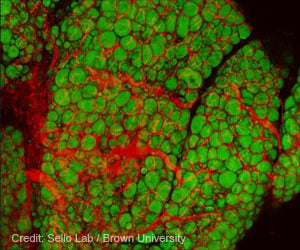Scientists have reengineered fat cells adipocytes that feed fatty acids energy needed to promote tumor growth and metastasis.

‘By utilizing fat cells with a therapeutic capsule, the team was able to demonstrate that the lipid metabolism pathway can be utilized for tumor specific drug delivery and drug development. ’





BACKGROUND The course of treatment for many people with a solid tumor includes surgery with chemotherapy, radiotherapy, or immunotherapy. Well there have been many improvements in treatment techniques over the past decade, the cancer often comes back after therapy and can be even more aggressive. In order to stop the cancer from recurring, drugs need to be delivered directly to the diseased site. Since fat cells are widely present in the human body and can be easily isolated and purified, the UCLA-led team thought they might be able to serve as a highly efficient drug delivery system. However, tumor cells trigger the fat cells to release the fatty acid to support tumor growth. To overcome this problem, researchers added anticancer therapeutics to fat cells to make them work as a Trojan horse once delivered into the tumor site.
METHOD
The team tested the new drug delivery system by using UCLA-engineered fat cells to carry lipid-linked doxorubicin, a chemotherapy drug commonly used to treat cancer, and found the drug was able to successfully load into the lipid droplets consisting of an anticancer fatty acid within the fat cells. Linking the fat-soluble lipid molecule to doxorubicin can help reduce toxicity of the drug toward fat cells and enhance drug loading capability inside the fat cells.
Once injected such fat cells into the tumor site or surgical site with residual tumor tissues, the encapsulated anticancer doxorubicin and fatty acid can be gradually released toward the tumor cells through lipid metabolism, subsequently inhibiting tumor growth and recurrence. Inside tumor cells, the lipid linked to doxorubicin can be effectively cleaved to show the killing effect of doxorubicin.
Advertisement
This research also indicated that tumor supportive cells within the tumor tissue could serve as Trojan horse for cancer therapy. The approach could not only be useful for delivering cancer drugs to tumors, but could potentially be applied to other lipid metabolism related diseases.
Advertisement















